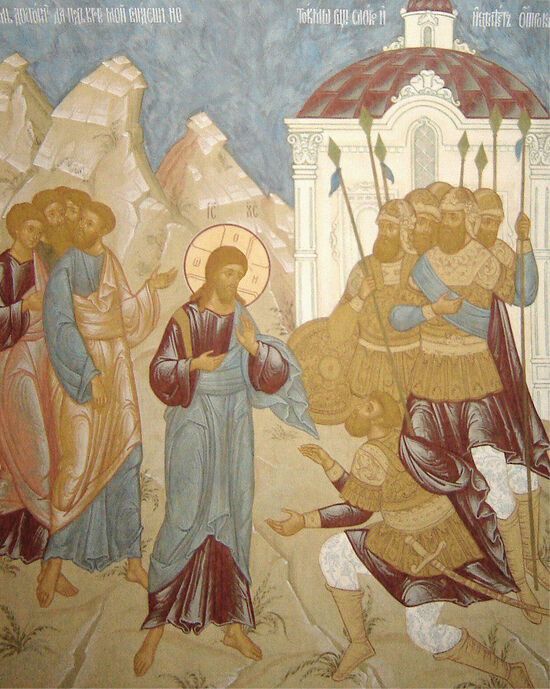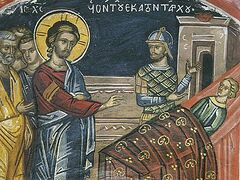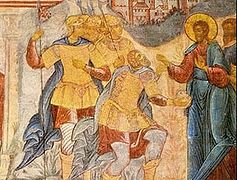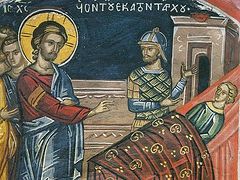Lord, I am not worthy that You should come under the roof of my house but only say the word and my servant shall be healed. Brethren, perhaps these are the most profound and heart-felt words addressed to Christ. These words reveal a deep, mystical Faith. It is necessary for use to take a lesson from the life-altering event heard about at the Gospel reading in today’s Liturgy. Earlier, we heard about a pagan Roman solider of significant rank, a Centurion, approaching and supplicating Christ to heal his servant. In the Roman Centurion, we see Faith unashamed and without guile. The lesson is that, despite being in the Church, we might not possess sincere Faith. Despite the fact that Jesus came to the lost sheep of the house of Israel, nevertheless, the Lord saw great Faith in those sincere gentiles who approached Him with steadfast conviction and clarity of spirit. Christ is no respecter of persons in terms of birth, rank, and occupation. He is the Immortal Judge, the Knower of every secret, the Cause and Source of Life, and the Vanquisher of Death. We recall that, in a similar instance, Christ addressed a Canaanite woman who entreated that He heal her daughter: Oh woman, Christ said, great is your faith! And Christ makes a similar statement concerning a pagan here, in today’s Gospel. The Centurion asks that the Lord do the miracle from afar, implicitly acknowledging Christ’s omnipotence: Lord, he said, I am a general and so are You! I say to my men go, and they go. And You can do the same for my servant—say the word, and He will be healed! The Israelites, as God’s beloved and elect people were put to shame in these words. The Lord said: I have not found such great faith, not even in Israel! And I say to you that many will come from east and west, and sit down with Abraham, Isaac, and Jacob in the kingdom of heaven. But the sons of the kingdom will be cast out into outer darkness.
Pure Faith, therefore, is the subject of today’s Gospel. To believe sincerely in Christ, with child-like simplicity, abandoned whole-heartedly to God’s unfathomable will—this is the challenge of our Christian life. Too often, we assume that Faith, sincere Orthodoxy, is the proper execution of prayer rules and fasts, and even attendance at Divine Services. This is the first level of Faith, one might say. Yet, this level exists to propel us into a deeper communion with Christ wherein He inhabits the totality of our person, reigning from the heart. We recall Christ’s words: If a man love me, he will keep my words: and my Father will love him, and we will come unto him, and make our abode with him. The entire Patristic tradition, which contains the tradition of Hesychasm and the Jesus Prayer, is very much Biblical and very much based on the in-dwelling of Christ in us and the uniting of our persons in Christ—which means a parallel unification with each other, with the Mother of God and the Saints, with our departed ancestors—with the whole Church. Orthodoxy is movement. Despite the idea that the Orthodox Church is an archaic organization with archaic and irrelevant rites, nevertheless, it is my sincere conviction that the Orthodox Church is a unifying entity with a vibrant, eternally relevant liturgical life. It is only within Orthodoxy that man can achieve his true purpose in life: to be united to God. St. Sophrony of Essex, whose feast day we just celebrated, made this claim, and furthermore taught that this is exactly what sets us apart from Roman Catholicism and the Protestant Confessions.
Deification—Theosis—is the goal of the Christian life, and not moralism in the sense of being a moral individual or accumulating good deeds and actions. These may aid us in the goal, in fact, they certainly do, but they are not in and of themselves the goal. Again we recall Christ’s words: The poor you will always have with you, you will not always have me with you. We live in an age of multifaceted activism. Everyone is an activist in some way, shape, or form, and everyone is someone’s advocate. Everyone is enraged and everyone wants justice. And few remember the age-old maxim from the Psalms: Learn righteousness you inhabitants of the earth! Zeal shall cease an untaught people! And it seems the Lord’s words escape the many: My kingdom is not of this world! The Orthodox Church engages in social work and feeding the poor, and care for the less fortunate are time-honored ministries within Church life. The goal, however, of Orthodoxy is to make citizens for Christ’s Kingdom, not to solve the fallen world’s issues. To alleviate them, perhaps. Yet they can never be solved due to the fact that here, sin reigns. And where sin reigns, destruction and suffering follow.
Sin reigns here, but we heard in today’s Epistle that we were set free from sin, only to become slaves of righteousness. We are Christ’s slaves, that is. What does this mean? The Romans had a concept of freeing slaves only for the slaves to take on wages and thus become employees of the household. The former slaves even had places at the family table. We do not cease to be men and women, sinful and fallen. Yet now we receive wages for our labor in Christ’s service. We are His. We are changed and transfigured by the encounter with the Living God-Man. We, as His children, are given rights—even the right to call God, Father. St. Paul in today’s Epistle exhorts us, present your members as slaves of righteousness for holiness—holiness which is quite simply Theosis, or attaining as much as is humanely possible to the divine nature is the essence and goal of Christianity. We must remember when we are tempted to sin that the end result of our sins and passions are death. And the sicknesses of the body are tied to the illnesses— that is, the sins—that reign in the soul.
What is the solution to the endless cycle of suffering, sickness, and ultimate death? The first Christians expected martyrdom. There was no room for cowardice or double standards. St. Paul is clear on this. Now having been set free from sin, having become slaves of God. This slavery to God, in reality, is freedom. Remember, Christianity is a faith of paradoxes. You are weak, but you are strong. You possess nothing, yet posses everything. They say to you run one mile, you run two. You loose your life, you die, only to gain it back again. And you are a slave, but you are ultimately free. Why are you free? The real slaves in this world are those who are enslaved to their sins and passions. And it is possible to nominally exist as an Orthodox Christian who is unserious and uncommitted—you might live the life of a fraud. There are many like this within the Church. Jesus, of course, was not oblivious to this fact. His warning is stark and unambiguous: You cannot serve two masters. You will either love the one and hate the other. Or you will serve the one and despise the other. You cannot serve both God and Mammon. We recall that now is the time the Lord has sent the Church in the world to preach the Gospel and serve the Sacraments. Yet, a time is coming—and perhaps is speedily arriving—and the time for testing, the time for learning, the time for patience and healing will be over. The time for threshing and gathering and separating the wheat from the tares, first and foremost in the Church and secondarily in the world, will arrive. The question is, what will the stance of each one of us be?
The Centurion’s Faith was pure and sincere.
The Holy Apostle Paul warns us that, to achieve holiness from which comes Faith we must be divorced from sin. And, the Holy Royal Martyrs of Russia which we celebrated yesterday and we continue to celebrate today in the persons of St. Elizabeth the Grandduchess and her assistant, the Nun Martyr Barbara, teach us that obedience and sense of duty put before any personal considerations are the hallmarks of a Christian’s character. Those of you who went to Matins today heard the following from the Gospel reading (Fourth Matins Gospel) in which the Angel addressed the Myrhbearing Women with, Why do you seek the Living among the dead? And if we belong to Christ, and if Christ is alive and the very definition of Life itself, why do we seek life and pleasure in sin? If we do so, we are seeking fulfillment among the dead. Sin is death, and we continue to commune with death and corruption. So, let us make a sincere effort from this moment to live for Christ, and no longer for ourselves. Let us make a sincere effort to work while it is daylight and still possible to work before the time for harvest arises. Lord, grant us firm convictions and unfailing resolve to serve You and Your Holy Orthodox Church to Your ultimate glory. Amen!




